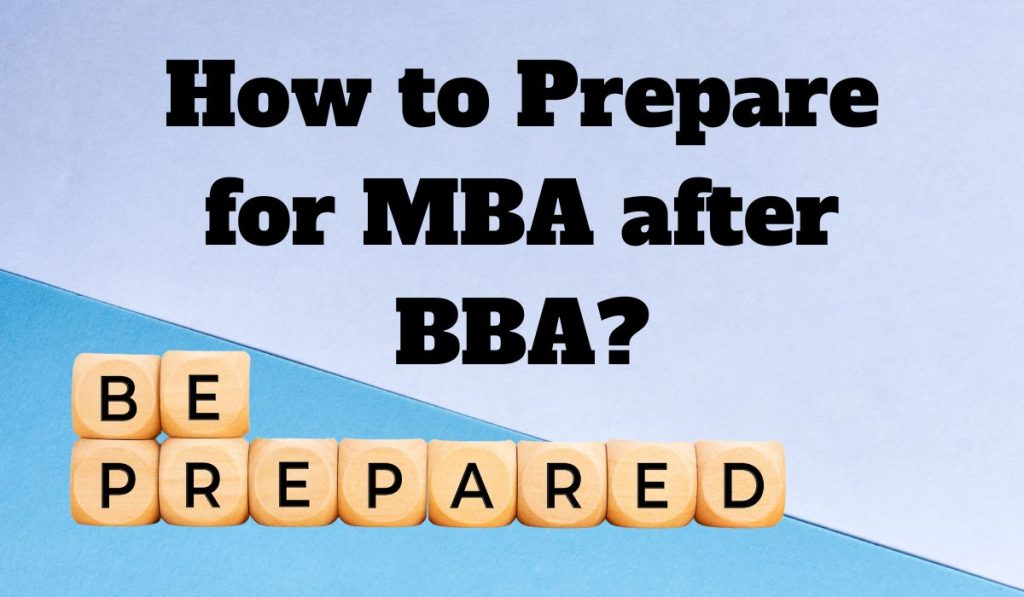
For students who have a strong interest in studying business and management and want to build a strong foundation in it, going on and doing an MBA after completing a BBA is a natural course. Not only does an MBA enhance your knowledge of business profiling subjects like finance marketing and human resource management, but it also imbues into you the mantle of a leader, strategic thinking, and networking opportunities that a BBA perhaps may not provide.
Looking for a BBA graduate (or soon to be) to know how to prepare for an MBA, then this guide is meant for you. Each crucial step – from the entrant’s exams to specialization and a long term career plan – we will comment on it in the following post.
How to Prepare for MBA After BBA?
- Know Why You Are Going to Get an MBA
Before getting into preparation, take a step back and consider why you want to go for an MBA. Is it to obtain a high-paying job? Start your own business? Climb the corporate ladder? Your motivation will assist you in making the appropriate choice between specialisations and the college.
- Start Early for Preparation of Entrance Pages
Most top-ranking MBA colleges demand clearing entrance exams such as CAT, XAT, MAT, NMAT, GMAT, etc., of the students. Preparing for these takes time as the students being BBA holders already have a business academic background and thus have an edge.
Focus subjects: Quantitative Ability, Verbal Ability, Logical Reasoning, Data Interpretation.
Use internet resources, join coaching classes if required, and the most important thing practical MOCK tests regularly.
- Practice of Communication and Soft Skills
Even though written exams hold key significance but group discussions and personal interview also has a major role to play during the MBA admission process. BBA students should concentrate on the development of:
- Public speaking
- Group communication
- Body language awareness
- Presentation skills
- Build a Strong Academic Record
Your BBA marks do matter! Most of the prestigious colleges give importance to your academic record, where you have 10th, 12th, and graduation scores. Strive for consistency in the work and have a strong academic record to improve the chances during the selection.
- Gain Practical Experience
If available, acquire internships while carrying out or after BBA. Work experience is not a criterion, but is highly preferred for most of the MBA programs in India. It provides you with more insight into the business world, letting your MBA study make more sense.
- Decide on the Right Specialization
When finding your way to the MBA, start researching which field you will be most interested in and the career path you desire. Popular options include:
- Marketing
- Finance
- Human Resources
- Business Analytics
- International Business
- Operations Management
Speak to senior professionals or staff to grasp what each specialisation is about.
Also read :
Best Management Colleges in Delhi
How Many Years of MBA after BBA?
An MBA course typically takes 2 years to complete following the BBA, but a few institutions present 1-year accelerated MBA programmes to individuals who have experience in employment.
In case of studying abroad, if you are planning to pursue an MBA, then the duration of the course can range from 12- 24 months, and the duration would be dependent on the curriculum and course structure in places like the US, UK, and Canada.
In short: Regardless of whether you do an India or a foreign/ international MBA, why don’t you expect your revision period of around 1.5 to 2 many years complete time according to BBA?
MBA After BBA Salary
The salary you can earn after completing an MBA depends on several factors, such as:
- The reputation of your MBA college
- Your specialization
- Your work experience (if any)
- Your location and the industry you work in
However, here’s a general overview of what BBA + MBA graduates might earn in India:
| Job Role | Average Salary (Per Annu |
| Marketing Manager | ₹7 – ₹12 LPA |
| Financial Analyst | ₹5 – ₹10 LPA |
| Human Resources Manager | ₹6 – ₹11 LPA |
| Business Analyst | ₹8 – ₹14 LPA |
| Operations Manager | ₹6 – ₹12 LPA |
| Product Manager (Tech/Startups) | ₹10 – ₹25 LPA |
Top MBA institutes often offer campus placements with packages starting from ₹10 LPA and going as high as ₹25 – ₹30 LPA in top-tier consulting, finance, or tech companies.
Jobs After BBA and MBA Salary
Let’s break it down:
Jobs After BBA
Once you have a degree of BBA degree, you are eligible to apply for jobs in lower-level positions like:
- Sales Executive
- HR Assistant
- Financial Analyst (Junior)
- Marketing Executive
- Operations Executive
BBA average salary in India after BBA ranges between ₹2.5 and ₹4.5 LPA as it solely depends on the position and company.
Jobs After BBA + MBA
Once you finish your MBA, you can look for mid-level or even management positions. Some roles you can get into, along with estimated salaries, are:
| Role | Starting Salary After MBA |
| Management Consultant | ₹8 – ₹20 LPA |
| Investment Banker | ₹10 – ₹25 LPA |
| Digital Marketing Manager | ₹6 – ₹12 LPA |
| Strategy Manager | ₹12 – ₹20 LPA |
| Business Development Manager | ₹7 – ₹14 LPA |
So essentially, while a BBA can get you started in the corporate world, an MBA can significantly accelerate your growth—both in terms of job role and salary.
Final Thoughts
Going for an MBA after a BBA is a great strategic move as it can lead to a plethora of career options. However, achieving success on this road means to work out carefully beforehand and have a real commitment. By acting early, targeting the right entrance exams, developing your skills, and getting practical experience, you can increase your chances of entrance to a top B-school.
It is not about the Degree; it’s about transforming yourself to be a leader, strategy, and problem solver. So, prepare, keep eyes ahead, and make your MBA dream a real one.







